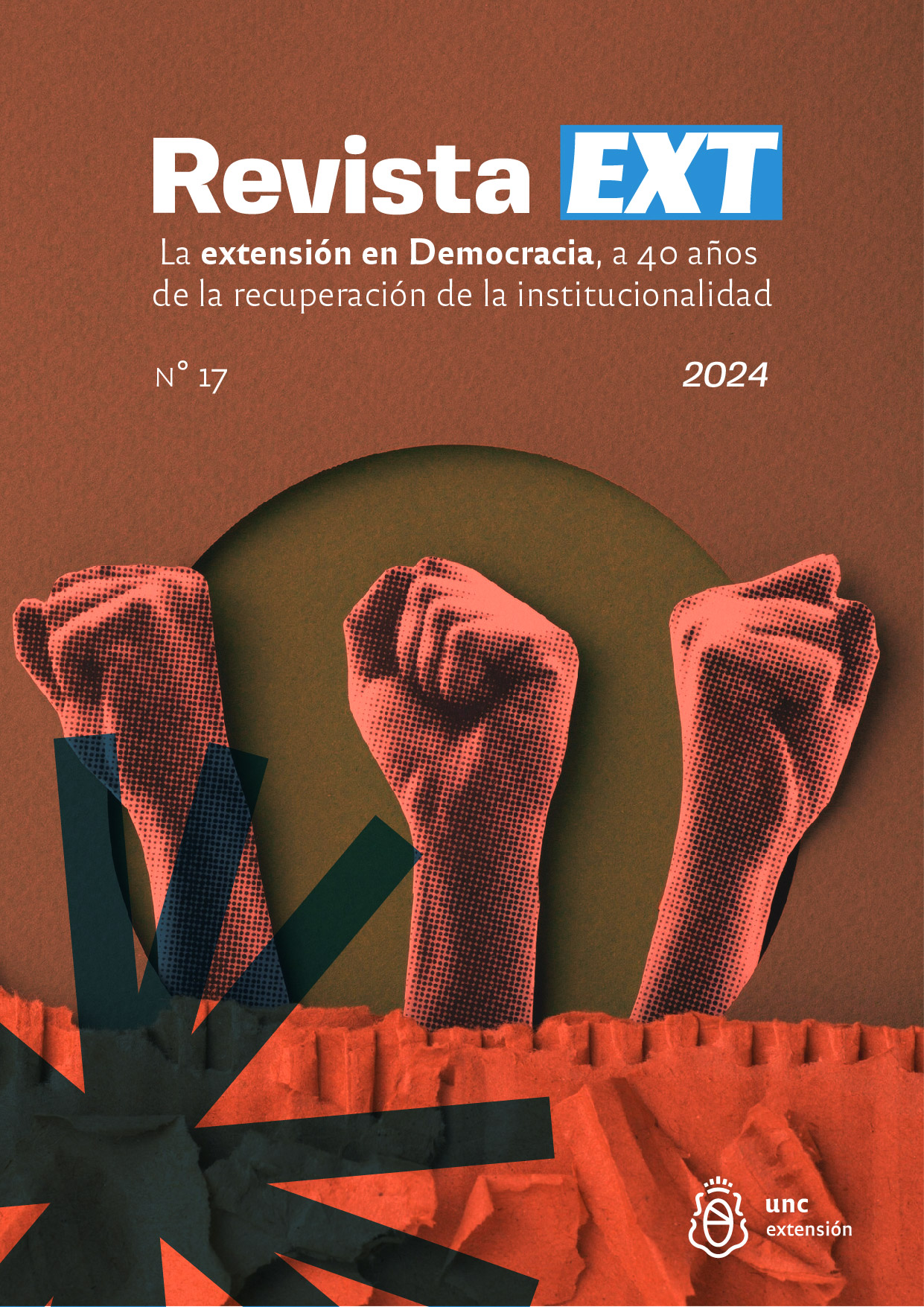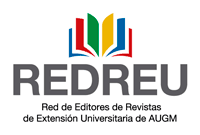Experiencia de cinedebate en un ISFD. Participación, audiovisuales y memoria
Palabras clave:
cinedebate; formación docente; participación; construcción colaborativa de saberes; memoriaResumen
En este trabajo buscamos describir una experiencia de práctica extensionista desarrollada en el marco del Programa de Extensión desde las cátedras de la Facultad de Ciencias de la Comunicación (UNC). Consistió en una Jornada de cinedebate organizada entre un Instituto Superior de Formación Docente y dicha unidad académica en torno a los 40 años de la recuperación de la democracia, que tuvo como propósito generar un espacio de diálogo, reflexión colectiva y “confluencia” de saberes de los diferentes participantes. Aquí se caracterizan las fases del dispositivo, se reflexiona sobre las diferentes formas en las que se promovió la participación, algunos criterios que fundamentan las decisiones sobre las películas y audiovisuales elegidos para el visionado, así como algunas líneas sobre las formas de las memorias promovidas. Argumentamos que la noción de democracia fue trabajada en dos planos: el eje temático en torno al cual se convocó, con finalidad de con-memoración y el dispositivo mismo ya que su diseño y ejecución procuró dar cuenta de la circulación de la palabra, el respeto por los saberes de la/s comunidad/es involucrada/s, la multiplicidad de perspectivas en juego y la construcción de una experiencia colaborativa de intercambio y construcción de conocimiento.
Descargas
Referencias
Arocena, R. (2011). Curricularización de la extensión: ¿por qué, cuál, cómo? En Integralidad: tensiones y perspectivas, pp 9-17. Cuadernos de Extensión N1. Universidad de la República.
Bergalá, A. (2007). La hipótesis del cine. Pequeño tratado sobre la transmisión del cine en la escuela y fuera de ella. Laertes.
Berti A. y Cáceres, E. (2018). Sobre la materia del tiempo. En T. Liponetzky y X. Triquell (comps). Cine y memoria. Narrativas audiovisuales sobre el pasado. Editorial de la UNC y CePIA Facultad de Artes. Págs. 15-30.
Da Silva Catela, L. (2018). Prólogo. Mirar las memorias, vivir el cine. En T. Liponetzky y X. Triquell (comps). Cine y memoria. Narrativas audiovisuales sobre el pasado. Editorial de la UNC y CePIA Facultad de Artes. Págs. 7-8.
Jost, F. (2007). Propuestas metodológicas para un análisis de las emisiones televisivas. En Rev. Oficios terrestres, Año XIII. La Plata: Universidad Nacional de La Plata, n°19. Pág. 154-164.
Lillis, T. (2021). El enfoque de literacidades académicas: sostener un espacio crítico para explorar la participación en la academia. En Enunciación, Vol. 26, número especial, 2021, pp. 55-67.
Liponetzky, T. y Triquell, X. (comp) (2018). Presentación. En Cine y memoria. Narrativas audiovisuales sobre el pasado. Editorial de la UNC y CePIA Facultad de Artes. Págs. 11-14.
Tommasino, H. y Cano, A. (2016). Modelos de extensión universitaria en las universidades latinoamericanas en el siglo XXI: tendencias y controversias. En Universidades, núm. 67, enero-marzo, 2016, pp. 7-24
Descargas
Publicado
Número
Sección
Licencia
Derechos de autor 2024 Secretaría de Extensión Universitaria

Esta obra está bajo una licencia internacional Creative Commons Atribución-NoComercial-CompartirIgual 4.0.
Aquellos autores/as que tengan publicaciones con esta revista, aceptan los términos siguientes:
- Los autores/as conservarán sus derechos de autor y garantizarán a la revista el derecho de primera publicación de su obra, el cuál estará simultáneamente sujeto a la Licencia de reconocimiento de Creative Commons que permite a terceros compartir la obra siempre que se indique su autor y su primera publicación esta revista.
- Los autores/as podrán adoptar otros acuerdos de licencia no exclusiva de distribución de la versión de la obra publicada (p. ej.: depositarla en un archivo telemático institucional o publicarla en un volumen monográfico) siempre que se indique la publicación inicial en esta revista.
- Se permite y recomienda a los autores/as difundir su obra a través de Internet (p. ej.: en archivos telemáticos institucionales o en su página web) después del proceso de publicación, lo cual puede producir intercambios interesantes y aumentar las citas de la obra publicada. (Véase El efecto del acceso abierto).





